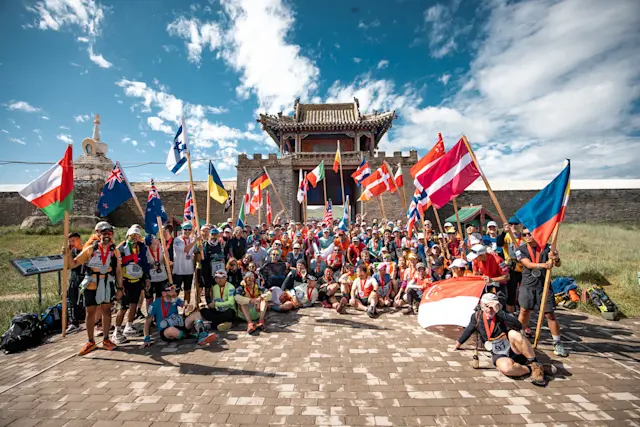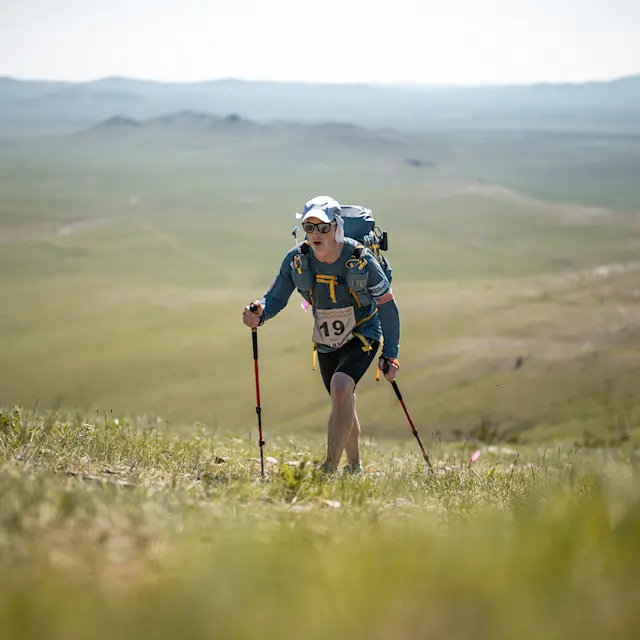Scott DeRue, an accomplished mountaineer and the President of Equinox, and Ken Rideout, a competitive runner, podcast host, and investor, share an inside look at what it’s like to compete in — and win — the grueling Gobi March.
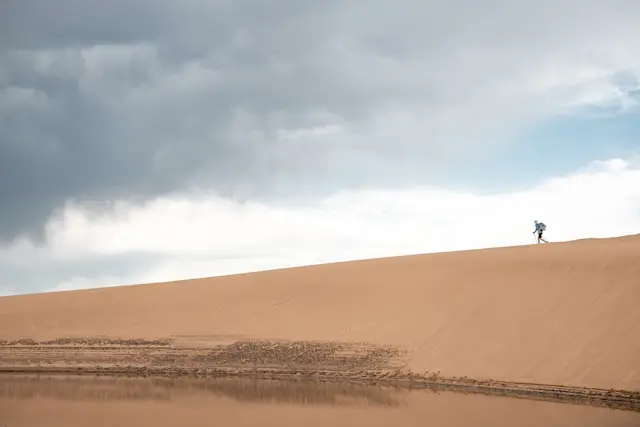
It sounds like a dream vacation: Visit Central Mongolia and spend a week exploring ancient cities and traversing the grasslands, forests, sand dunes, and rock valleys of the country’s stunning Karakorum region.
But for some, this jaunt through the countryside is far too leisurely, lacking any risk that’s simultaneously exhilarating and terrifying.
Enter: The Gobi March, an ultramarathon hosted by RacingThePlanet that takes adventure-seekers on a 155-mile journey through those impressive Mongolian terrains. Braving the unpredictable elements, competitors overcome more than 14,000 feet of elevation gain and 13,000-plus feet of elevation loss, all while carrying their own food, sleeping bag, and other essentials. It’s not for the faint of heart.
This year, Equinox President Scott DeRue and competitive runner Ken Rideout didn’t let fear stop them from attempting to complete the ultramarathon — or clinch the winning spot.
To get the full race experience — from the inspiration to participate and the prep work to the grueling effort of the final few miles — we chatted with Rideout and DeRue before and after completing the arduous course. Here are their stories.
The Motivation to Compete
Rideout first heard of the Gobi March only four weeks before kickoff. He had just wrapped up a 17-month international marathon circuit, racing and snagging spots on the podium in New York, Boston, Tokyo, Chicago, London, and Berlin. When the runner’s high faded, he wasn’t sure what challenge he’d brave next. Then, DeRue, with whom he connected through Equinox, told him about the ultramarathon in the Mongolian desert. “When he said that, I had this moment of fear, like, ‘Holy shit — that’s scary,’” Rideout recalls. “But part of me was like, ‘I think I can win that.’”
The marathoner has never been one to succumb to fear, a trait he developed while growing up in Boston and attending a high school he describes as “violent and aggressive.” That said, he still feels and acknowledges his fear — he just doesn’t allow it to paralyze him or make him feel like a “wimp.” “The coward and the hero feel the same emotions,” he says. “The coward just gets frozen, and the hero’s like, ‘F*ck it. I'm doing it anyway.’”
That valiant attitude is why Rideout uses every last drop of energy to win each race he participates in, even if that means he collapses at the finish line and gets carried out in an ambulance. (It’s happened two or three times over the years, he says.) It may sound a bit extreme — he is no Olympian, after all — but Rideout explains that races allow him to build a fulfilling, memorable life. “Life isn't just going through the motions and being mediocre,” he says. “To me, that's a worse fear than death. If you think of life like a big amusement park, I want to make sure I try all the rides, even the new ones.”
Unlike Rideout, DeRue didn’t head into the race as a fierce competitor. He doesn’t frequently compete in running events, but he craves adventure, an itch typically satisfied by mountaineering and climbing the Seven Summits (he’s conquered all but one — Carstensz Pyramid). That’s why participating in the Gobi March, an unfamiliar yet enthralling type of expedition, felt like a no-brainer. “I am inspired by the spirit of adventure and challenging myself to push the boundaries of what we think is possible,” says DeRue. “To explore the world — and to explore what we are capable of — is where I find true joy.”
Prepping for the Gobi March
Running 155 miles over the course of seven days was nothing for Rideout to seriously sweat over. He had gotten used to running a seven-minute mile throughout his marathon training, but he needed to focus on building strength and endurance for the March. In the weeks before the race, he tested three or four backpacks to find one that didn’t chafe his skin. He began running long distances — often a total of 90 miles a week — carrying a 20-pound pack, which gave his ankles and knees a beating, he says.
DeRue took a similar approach to prep work, albeit with a bit more time. In the six months leading up to the competition, he ran four to five times per week, averaging eight to 20 miles per workout. Over time, he began carrying his pack during his sessions to simulate the Gobi March conditions, and he also practiced functional strength training to help him power through the longer race days, he says.
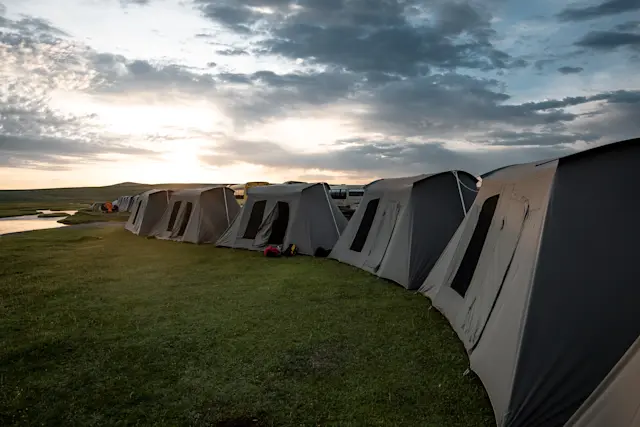
What intimidated both Rideout and DeRue most, though, was the idea of carrying all their food on their backs — while keeping their packs as light as possible. The competitors each stocked up on lightweight, freeze-dried food, gels, and energy or meal replacement bars. And Rideout accounted for all but one race day, during which he planned on scavenging for calories among fellow competitors, he says. “I've got all this freeze-dried food and I’m trying to manage having just enough — not too much, not too little,” Rideout says. Also a concern for the marathon runner: sleeping in a tent and not showering for six days. “How am I going to recover when sleeping on the ground?” says Rideout. “All these things are playing around in my head that are making me super anxious.”
There was also a bit of mental preparation. A longtime mountaineer, DeRue leaned into the lessons he learned on his climbs and focused on finding joy in the suffering. “I’ve found that I enjoy the hardest days the most — either in training or in the actual climb,” he says. “These are the moments where you feel most alive because you are finding your edges, your own boundaries. I expect the same will be true for the Gobi March. I’ll have some good moments and some really tough days, but if I can stay focused on the joy of the moment — no matter how difficult — [I’ll] just keep moving forward.”
Rideout, on the other hand, weighed his racing strategy: Does he try to stay with the competitor who starts off lightning-quick? Or does he recognize that person will likely burn out fast, so he should stick with his pace? To determine his game plan, Rideout sought the advice of Charlie Engle, the author of Running Man who previously participated in the Gobi March. Engle’s biggest tip: Be patient, and don’t empty the tank on day one.
“I'm trying to be aware of the things that I can imagine going wrong,” Rideout adds. “The list goes on forever. It's infinite. But in truth, all I can do is manage what's in front of me one day at a time, one step at a time…[I’m trying to] keep a fine balance between preparing for what could go right, what could go wrong, and having a mentality that, ‘I'm going to control the things I can control and whatever happens, I'm still going to win.’”
DeRue’s 155-Mile Race
Heading into the Gobi March, DeRue had just two goals: to find a sense of community among the other runners and to finish the race, preferably in good spirits. He was unsure if his training would truly be enough to check off the latter. But thanks to his experience mountaineering and tackling other endurance feats, he felt confident in his mental and physical ability to keep putting one foot in front of the other, DeRue recalls in a post-race interview.
The first leg of the race, a 21-mile stretch, was a breeze. “I said to myself, ‘Okay, that wasn't that bad,’” says DeRue. “But the next day was 27 miles, and that was longer than I've ever run…That second day was probably my hardest day.” Running long distances back-to-back took a toll on DeRue, largely because he hadn’t yet fine-tuned his nutrition. He wasn’t eating enough calories early in the day, and he was ending the night with leftover food, he remembers.
After realizing his refueling plan was leaving him on E before he even reached the end of the day’s course, DeRue shifted his approach. “The morning of day three, I was consuming a lot more calories early in the day,” he says. “I took care of myself more effectively and I felt more energy, both during the day as well as once I finished that evening in camp.” DeRue felt more confident in his ability to finish the race on a high note, and recovering from the thousands of steps he took was getting easier; surprisingly, he experienced less muscle fatigue as the days dragged on, he says.
Still, the idea of running the Long March — the 50-mile fourth stage that takes place over two days — was a cloud hanging over his head. On the trail, the mental tactics he used to successfully scale sky-scraping mountains kicked in. He moved at a sustainable pace. He focused on hitting the next checkpoints, which were spaced six to seven miles apart, rather than thinking about completing all 50 exhausting miles. And he formed friendships with the folks running around him, whose life stories were a welcome distraction from the grind. “For me, that sense of community, combined with the mental trickery of breaking up the race into the stages, really enabled me to finish the 50 miles with a smile on my face,” he says.
Though DeRue ended up with more blisters on his feet than he was hoping for, he was able to complete the race in 44:02:30 — securing 40th place out of 102 finishers — without any injuries, he says. Importantly, he walked away with tentmates-turned-friends and once-in-a-lifetime memories as souvenirs. During the scorching second leg, for instance, he encountered nearly vertical dunes that repeatedly filled his shoes with gritty sand. “You're in the middle of massive sand dunes, wondering, ‘Why am I doing this?’ but then you find this euphoric moment because it's so beautiful,” says DeRue. “Some of my most vivid memories are the views of the Mongolian countryside and the Gobi Desert. You see such diverse terrain — it's green, it's sand, it's mountainous. I just found it inspiring and breathtaking.”
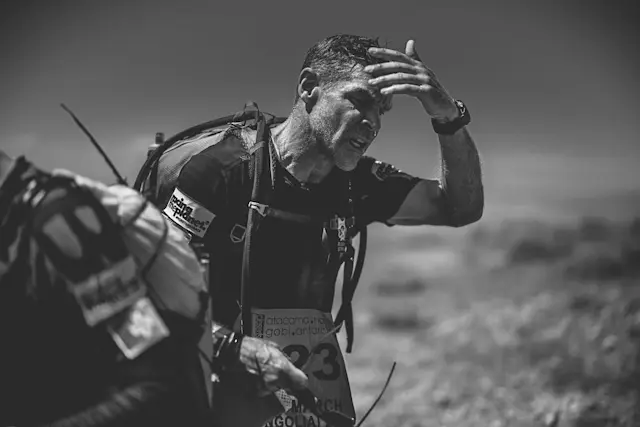
Ken Rideout competing in the Gobi March
Rideout vs. Mongolia
Sleep-deprived and exhausted from 30 hours of travel, Rideout completed the first 21-mile leg of the Gobi March in three hours and 31 minutes, clinching the fifth spot. Cue the panic. “I was like, ‘Holy shit, I'm gonna get killed,’” Rideout recalls in a post-race interview. “It turned out that the first day was my worst, and I just got stronger as the event went on.”
He held down second place in stages two and three, the latter of which featured the steep sand dunes that even camels refused to traverse, he says. Crawling on his hands and knees up the hill, Rideout says the experience was “demoralizing,” and some competitors quit the race right then and there, he notes.
Of course, Rideout persisted. He headed into the Long March with his sights set on overtaking the leader, a Swiss man who had already won two RacingThePlanet ultramarathons. He continuously pushed the pace. Mid-way through the event, the frontrunner began to struggle in the 100-degree desert heat, so much that the competitor laid on the ground and said he couldn’t go on, recalls Rideout.
Rideout says he poured his water on his rival and tried to help him continue moving until the next checkpoint. Soon enough, a support vehicle drove by and pulled over to help, he notes. Once the situation was under control, Rideout took off and secured a 30-minute lead. “The last seven miles of the 50-mile leg were my fastest miles of the day,” he says. “I had been feeling good anyway, but then I had a chance to recover when I was sitting with this guy.”
Although Rideout finished second in the 24-mile stage five, beaten by the Swiss man who had recovered from the day before, he still had a stronghold over his competitors. On the final day — a quick 10K — Rideout didn’t take it easy. “I could have walked in and still won, but I was like, ‘If I'm gonna win the whole race, I want to run across that line first,’” he recalls.
And so he did. On June 24, Rideout crossed the Gobi March finish line, closing out with a time of 26:07:38 and snagging the first-place title.
That’s not to say it wasn’t a hard-won battle. Throughout the week, Rideout says he peed in his shorts mid-run and in his water bottle (yes, the one he drank out of) during the night to avoid leaving the tent. He was attacked by a nomad’s dog. He supported himself on 2,500 calories a day while burning 10,000. And he slept so terribly, he often wondered, “What the eff am I doing here?” “It was all a steep learning curve,” he recalls. “I knew that people who had done [the race] before were going to have a huge advantage over me, but that was the challenge to me. Can I adjust and adapt and deal with all these variables so quickly that I can make up for all that experience and still beat these guys at the race? And I did."
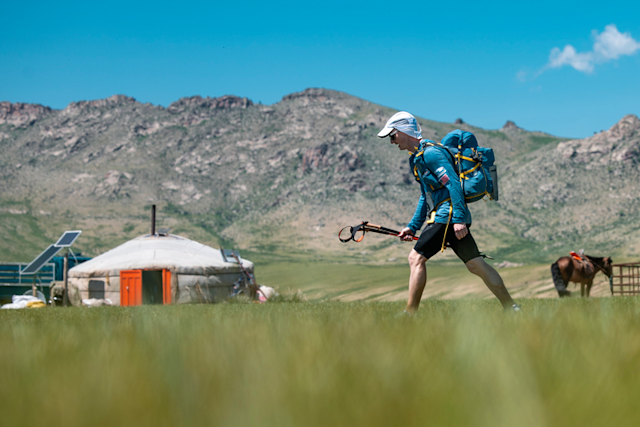
Scott Derue competing in the Gobi March
The Takeaways
To Rideout, winning the Gobi March was simply a bonus. What he valued most was the growth that came from participating in a race that “scared the shit out of” him, he says. “If you've worked hard, you've saved your money, you're living in the house you want, and done all the right things, it's easy to get in that comfort zone and then stop experiencing growth,” says Rideout. “This can sound a lot like hyperbole for some people, but I genuinely use these types of events as a way to not only demonstrate to my children, but also to myself that you have to get out of your comfort zone to have any kind of growth.”
Unlike DeRue, who intends to do another RacingThePlanet ultramarathon in the future, Rideout has his sights set on a brand-new challenge — one that doesn’t involve camping. Still, he does plan on applying his learnings to his next expeditions, potentially the TransRockies Run or Leadville Trail 100 Run. “Ultimately, slow and steady is going to win this long race of attrition,” says Rideout. “I've never felt more proud of myself for being able to execute in the way that I did, because it was such a long process that it required tremendous patience and incredible perseverance to continue to, just like a turtle, keep moving.”
The lessons learned from the Gobi March — of perseverance, of pushing your mental and physical limits — can be applied outside the bubble of competition, too, says DeRue. “In all of these challenges that we take on, I think you learn the power of the human spirit and the power of resilience and mental fortitude,” he says. “...No matter how strong you are, no matter how fast you are, you're going to find those [challenging] moments, whether you're on all fours crawling up a sand dune or you're crossing a river and you fall in.” Throughout your years on this planet, you’re going to encounter career hardships, relationship struggles, and personal failures.
“The question is,” says DeRue. “Can you pick yourself up? Can you keep going? And can you do it with a smile on your face?”
